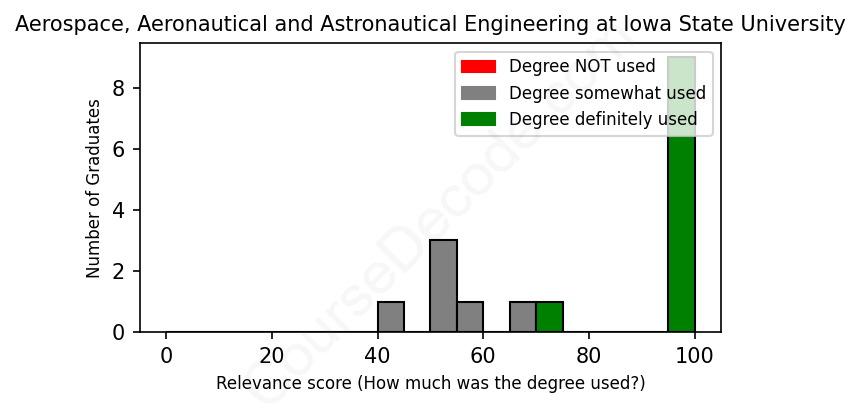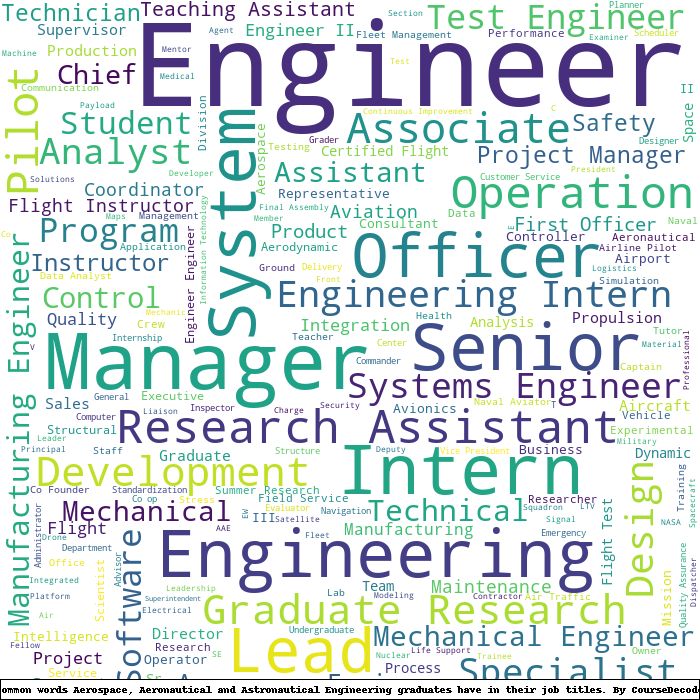
First, some facts. Of the Aerospace, Aeronautical and Astronautical Engineering graduates from Iowa State University we've analyzed , here's how many have used (or NOT used) their degree in their career:

These are estimates based on AI analysis of 16 LinkedIn profiles (see below).
The verdict? Significantly above average. Overall, with an average relevance score of 80%, Aerospace, Aeronautical and Astronautical Engineering graduates from Iowa State University have a much higher likelihood (+13%) of finding work in this field compared to the average graduate across all fields:
And for comparison, here's the chart for all profiles we've looked at across all degrees.
Also, after graduating, only 25% of these graduates have pursued further education other than another Bachelor's degree (such as a Masters degree or other), compared to the average across all profiles of 35%. This suggests a Bachelors degree is enough for most Aerospace, Aeronautical and Astronautical Engineering graduates, and it's normal to look for work straight after graduation.
See the details:
|
Relevance score: 100% We think this person has gone into a career highly relevant to their degree. We think this person has gone into a career highly relevant to their degree.
DEGREE INFOGraduated in 2020 from Iowa State University with a Bachelor of Engineering (B.E.) in Aerospace, Aeronautical and Astronautical Engineering. No other secondary education since. JOB HISTORY SINCE GRADUATIONCompletions Engineering Mechanical/Harness Design - EI Gulfstream Aerospace Feb 2021 - Mar 2022 Completions Engineering Electrical/Software Liaison  Gulfstream Aerospace Mar 2022 - Present ABOUTAn Experienced Aerospace Engineer specializing in harnesses with over 3 years of industry experience throughout various disciplines ranging from government, to military, currently commercial.Technical Expertise:SolidworksCATIA V5Capital HarnessCapital LogicPythonVisual Basic for ApplicationsNotable Achievements:Gulfstream Continuous Improvement Speaker (2022) for developing a tool that automates the 3d design check process. |
The top 10 most common jobs done by the graduates we've analyzed (ranked most common to least) are:
From the profiles of graduates from Iowa State University with degrees in Aerospace, Aeronautical, and Astronautical Engineering, it's clear that many have landed roles that are closely tied to their field. Common job titles include Design Engineer, Systems Engineer, and Aerospace Engineer, with companies like Lockheed Martin, Northrop Grumman, and Collins Aerospace frequently appearing in their job histories. Positions in these organizations typically demand the application of aerospace engineering principles and technical skills that directly relate to their academic training. So, when these graduates step into roles like Mechanical Engineer or Systems Engineer, they are pretty much using what they learned in school on a daily basis.
However, not all paths taken by these graduates are strictly aligned with their degree. Some have ventured into roles that, while they may benefit from general engineering skills, don't directly require aerospace expertise. For example, positions like Product Manager at Microsoft or a Software Development Engineer Intern at Amazon involve skills that can be found in many engineering disciplines but don't necessarily require specific aerospace knowledge. Overall, while a good portion of these graduates have pursued careers directly related to their studies, there are also instances of people taking on roles in more diverse or unrelated fields, suggesting a broader application of their skills. It's a mixed bag, but a decent chunk remains connected to aerospace engineering!
Here is a visual representation of the most common words in job titles for Aerospace, Aeronautical and Astronautical Engineering graduates (this is across all Aerospace, Aeronautical and Astronautical Engineering graduates we've analyzed, not just those who went to Iowa State University):

For graduates with a degree in Aerospace, Aeronautical, and Astronautical Engineering from Iowa State University, the career trajectories generally seem quite promising. Many of them land their first jobs soon after graduation in technical roles such as design engineers, mechanical engineers, and systems engineers at reputable companies like Lockheed Martin, Collins Aerospace, and Boeing. This suggests that the university's program adequately prepares students for practical, industry-relevant positions right out of the gate. Job titles in the first few years typically revolve around engineering or software roles related to aerospace, with responsibilities that align very well with their academic background.
As we look five to ten years down the line, many alumni appear to climb the ranks within their respective companies or transition into higher-level positions. For example, some have progressed to senior roles, such as Senior Principal Engineer or Senior Systems Engineer, often at leading aerospace firms. A few have even branched out to entrepreneurial ventures or ventured into product management at tech giants like Microsoft, showing versatility in their skill sets. Overall, it seems like a lot of graduates successfully turn their education into rewarding careers, often staying in the aerospace field or tech companies where their engineering skills are still central to their roles.
Getting a Bachelor's degree in Aerospace, Aeronautical, and Astronautical Engineering can definitely be a challenging ride. At schools like Iowa State University, you'll dive into complex topics like fluid dynamics, propulsion systems, and materials science, which means a solid grasp of math and physics is essential. The coursework can be pretty intense, with demanding labs and design projects that really push you to think critically and creatively. It's definitely considered harder than average compared to some other engineering disciplines, so you should be prepared for a lot of late nights and group study sessions. But hey, if you're passionate about it and willing to put in the effort, it can also be super rewarding!
Most commonly, in the LinkedIn profiles we've looked at, it takes people 4 years to finish a Bachelor degree in Aerospace, Aeronautical and Astronautical Engineering.
Looking at these Iowa State University grads, it seems like most of them are doing pretty well financially, especially considering the industries they've entered—think aerospace giants like Lockheed Martin, Northrop Grumman, and Boeing. Engineers generally pull in solid salaries, and what's really cool is that many of them are climbing the ladder fast; for instance, the 2014 grad went from Mechanical Engineer to Senior Principal Engineer in just a few years, which likely means a nice pay bump. Even the recent grads from 2020 and 2022 are landing roles at reputable companies, and while they might be starting out at lower salaries, they’re on paths that could lead to good money down the line. Overall, it looks like they’re set for decent earnings in their careers!
Here is a visual representation of the most common words seen in the "about" section of LinkedIn profiles who have a Bachelor degree in Aerospace, Aeronautical and Astronautical Engineering (this is across all Aerospace, Aeronautical and Astronautical Engineering graduates we've analyzed, not just those who went to Iowa State University). This may or may not be useful:

Here are all colleges offering a Bachelor degree in Aerospace, Aeronautical and Astronautical Engineering (ordered by the average relevance score of their Aerospace, Aeronautical and Astronautical Engineering graduates, best to worst) where we have analyzed at least 10 of their graduates:
| College | Score | Count |
|---|---|---|
 Texas A&M University Texas A&M University
|
87 | 22 |
 California Polytechnic State University-San Luis Obispo California Polytechnic State University-San Luis Obispo
|
86 | 12 |
 University of Cincinnati University of Cincinnati
|
86 | 10 |
 Purdue University Purdue University
|
85 | 40 |
 Rensselaer Polytechnic Institute Rensselaer Polytechnic Institute
|
85 | 17 |
 Georgia Institute of Technology Georgia Institute of Technology
|
84 | 23 |
 Liberty University Liberty University
|
81 | 21 |
 Iowa State University Iowa State University
|
80 | 16 |
 University of Colorado Boulder University of Colorado Boulder
|
80 | 13 |
 California State Polytechnic University-Pomona California State Polytechnic University-Pomona
|
79 | 13 |
 United States Naval Academy United States Naval Academy
|
77 | 12 |
 The Ohio State University The Ohio State University
|
76 | 20 |
 University of Central Florida University of Central Florida
|
75 | 25 |
 Arizona State University Arizona State University
|
74 | 12 |
 University of Michigan University of Michigan
|
74 | 10 |
 Embry-Riddle Aeronautical University Embry-Riddle Aeronautical University
|
71 | 163 |
 Penn State University Penn State University
|
68 | 12 |
 Florida Institute of Technology Florida Institute of Technology
|
67 | 20 |
 The University of Alabama in Huntsville The University of Alabama in Huntsville
|
67 | 11 |
 Embry Riddle Aeronautical University-Worldwide Embry Riddle Aeronautical University-Worldwide
|
66 | 10 |
 University of Illinois at Urbana-Champaign University of Illinois at Urbana-Champaign
|
48 | 10 |